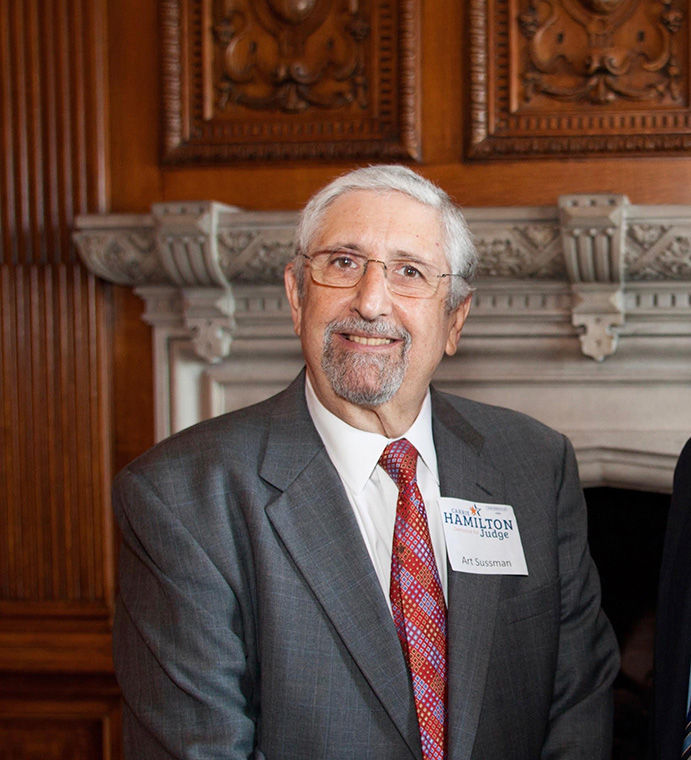Trustee Arthur M. Sussman dies at 73, always ‘caring and compassionate’
Arthur M. Sussman joined Columbia’s board of trustees in 2009. During his time at the college, Sussman was a part of both the Executive and Finance Committees and also served as chair of the Academic Affairs Committee.
August 21, 2016
Arthur M. Sussman, a Columbia board of trustees member since 2009, died Aug. 10 due to cancer complications, according to his wife Rita P. Sussman and son Eric H. Sussman. He was 73.
Chester T. Kamin, vice chair of Columbia’s board of trustees, said Sussman remained caring and compassionate until his last days.
Kamin recalled visiting Sussman in the hospital where he was receiving an experimental treatment to combat Non-Hodgkin lymphoma, adding that Sussman told him the life stories, anecdotes and frustrations of all of his caregivers.
“He knew the names of just about every nurse or aide who came in,” Kamin said. “Here was Art—gravely ill, not specifically comfortable—and he was worried about his caregivers … and how to help them do their jobs better. That was classic Art. He was always trying to make things better for people.”
At the beginning of his career, Sussman served as legal counsel for Southern Illinois University and was an associate partner at Jenner & Block, where Kamin said the two first met. Later, in 1979, Sussman was appointed chief legal officer at the University of Chicago, according to an Aug. 12 email from Columbia President & CEO Kwang-Wu Kim.
He is survived by his wife Rita P. Sussman, his son Eric Sussman and his daughter Johanna Ilfeld.
His wife, Rita P. Sussman, said they met when working at their college newspaper, The Cornell Daily Sun, where they both served as members of the editorial board and eventually competed against each other for the associate editor position, which he won. During his time at the paper, Sussman got the chance to interview Dr. Martin Luther King, Jr., Eric H. Sussman said.
Rita P. Sussman said they remained colleagues until one major historic event.
“Our relationship took off during and after the Cuban missile crisis,” Rita P. Sussman said.
Sussman earned a Bachelor of Science in labor relations from Cornell University and a Juris Doctor from Harvard Law School, Kim said in the email, adding that as a member of Columbia’s board of trustees, Sussman was a part of both the Executive and Finance Committees and also served as chair of the Academic Affairs Committee.
Although Sussman received an Ivy League education, he believed students should not be limited to these types of institutions and everyone should have a right to learn, Eric H. Sussman said.
“He was a great resource [for the college],” Board of Trustees Chairman Bill Wolf said in an Aug. 17 interview with The Chronicle. “When there was a tough question that came up, you could get a thoughtful and balanced response from Art that would be useful in making the right decisions for the school…. He will be missed.”
Wolf, who met Sussman when he joined the board in 2013, described Sussman as a terrific, thoughtful and articulate person.
Kamin said Sussman was a key player during former President Warrick Carter’s last years at the college and a critical member of the Presidential Search Committee. Kamin said Sussman asked tough questions and made sure Columbia had the right candidates before electing Kim in 2013.
“During the last years of the previous administration, there were a number of really serious issues, and morale at the college was not good,” Kamin said. “Art played a critical role in holding together the college and helping us get a new president, who has been very successful.”
From 2001 to 2010, Sussman was vice president of the John D. and Catherine T. MacArthur Foundation, an independent foundation focused on supporting “creative people, effective institutions and influential networks,” according to its website. There he supported funding of Chicago-area art and theater organizations.
Alan Teller, former adjunct professor in the college’s Photography Department and former executive director of the Adlai Stevenson Center on Democracy, still remembers the first time he met Sussman when he visited him at the MacArthur Foundation to request funds for a project.
He recalled a time when Sussman, who also shared a passion for photography, and his wife, traveled all the way to India for Teller’s photography exhibition.
Teller said Sussman enjoyed traveling and theater and was particularly interested in social justice issues and politics.
Rita P. Sussman said her husband had been immersed in photography as long as she had known him, but he continued to train himself over the years to improve his skills.
“He had some wonderful photos he took of my son building a block structure and then tearing it down,” Rita P. Sussman said.
An avid sculpture collector, Sussman would travel around the world buying masks and sculptures from art galleries and flea markets, where he would negotiate the prices of these objects with locals, Rita P. Sussman said.
Sussman was also passionate about his family, including his six grandchildren, for whom he wrote an autobiography when he was 70. Sussman wanted them to remember their history and family roots, Eric H. Sussman said.
“He was a loving and devoted man to me and his family,” Rita P. Sussman said.








